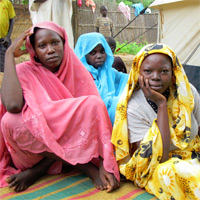
Malakal, Upper Nile State, South Sudan – Just five days after the town of Malakal awoke in the middle of the night to the sounds of heavy gunfire last month, the capital of the volatile Upper Nile state was again bustling. Yet all was clearly not well. Men aligned with the state security forces could be seen roaming the town, seemingly ubiquitous, while soldiers with AK-47s manned the checkpoints in and out of town. The sense of paranoia and unease was almost palpable. While the Sudan People’s Liberation Army-affiliated forces eyed the people of the town with suspicion, the citizens of Malakal tried to keep their heads down as much as possible, for fear of harassment or worse. An increase in security presence is not new to the people of this area, and unfortunately, it rarely brings much of a sense of security.
The March 12, 2011 incident which led to this state of disquiet was yet another militia-led assault, this time targeting a state capital. According to a U.N. report from mid-April, more than 800 people had died in South Sudan violence since the beginning of 2011, and almost 94,000 had been displaced.[1] The attack on Malakal, which followed a botched attempt at integration as well as years of tension between the government and the citizens of the region, is in many ways illustrative of the weaknesses of the government approach to dealing not only with these militias but also with the concerns of its citizenry. At best, the approach to militia groups – which up to this point has been to deal with them militarily or offer amnesty and integration – has been insufficient to deal with the problem and needs a serious rethink. At worst, the approach has contributed to the predicament, by enabling a situation in which the grievances against the state security apparatus are multiplied, thus making the people especially prone to manipulation by those wanting to dismantle the state.
[1]“Over 800 Killed in South Sudan since January: UN,” AFP, April 13, 2011, available at: http://www.google.com/hostednews/afp/article/ALeqM5gd2E8ZAEGaLlWhjY6RtUPctCa0lg?docId=CNG.02e59dd6cb2c6353408522f79d0dd27f.331.A-SIB-2-SSDF.pdf.

